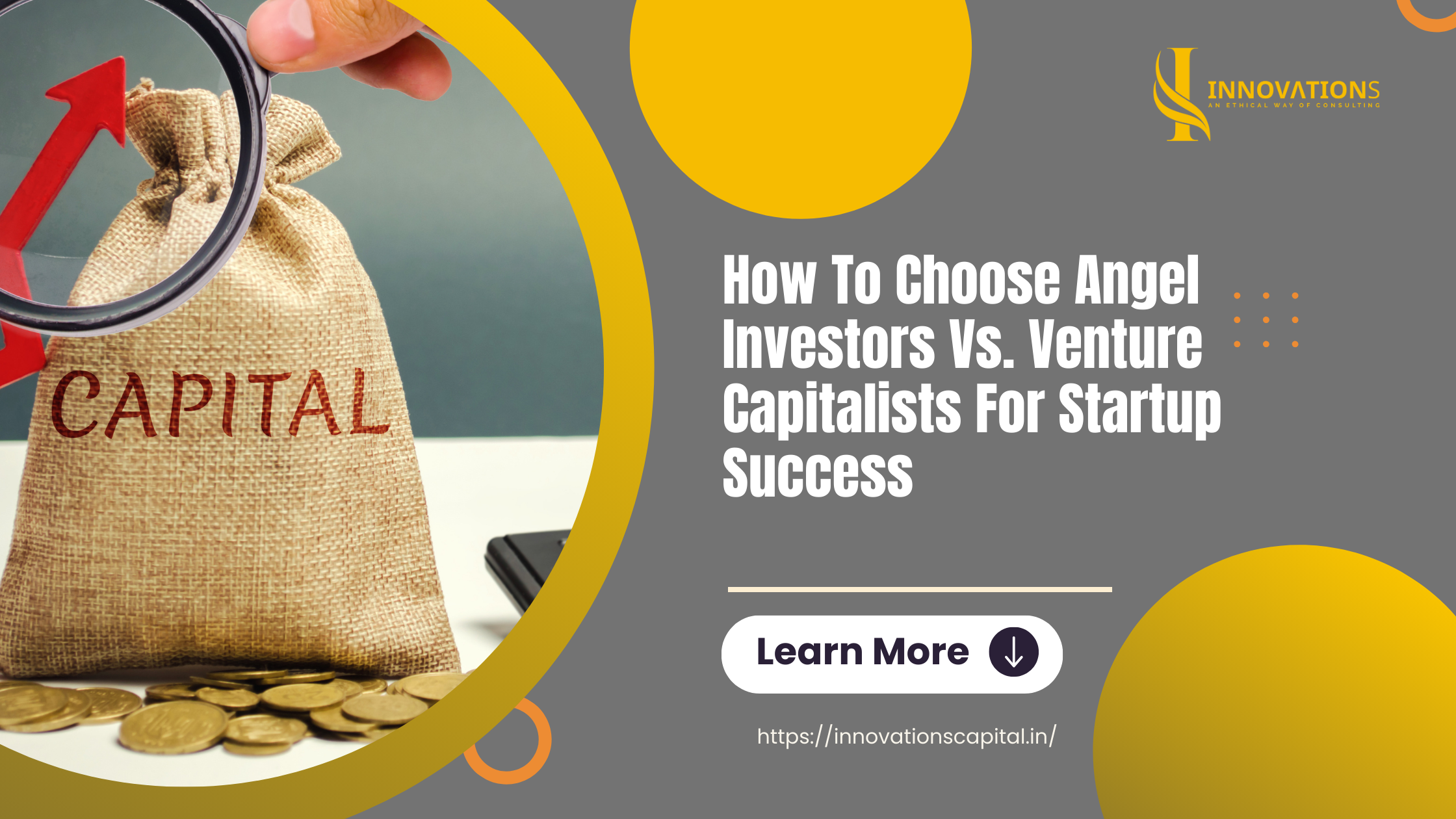Introduction:
Raising capital is the make-or-break challenge for most early-stage startups. But securing funding from the right investors can set a startup on the path to success. Consider how pivotal early funding was for unicorn startup Slice. Back in 2015, Slice raised $500,000 in seed funding from an Indian VC firm. That enabled Slice to hire a core team and build an innovative credit card payment app. Just 5 years later, Slice is valued at over $1 billion.
Stories like Slice underscore the importance of identifying the optimal investors for your unique startup. When seeking early capital, the two main options are angel investors and venture capitalists (VCs). Both provide vital funding, but have different investment strategies and expectations. Angel investors use their personal wealth to fund startups at the earliest stages, while VCs manage pooled capital from institutions or wealthy individuals, investing larger amounts in more mature startups. With India’s startup ecosystem booming, founders have more financing options than ever. Choosing the right funding partners is crucial to setting your startup on the path to success. This guide will compare angel investors vs venture capitalists to help identify the best source of capital for your needs.
Who are Venture Capitalists?

Venture capitalists (VCs) are professional investors who provide funding for startups and small businesses with high growth potential. They invest using capital raised from institutions and wealthy individuals.
VCs typically invest larger amounts than angel investors. A first-round VC investment often ranges from $2-10 million. Follow-on rounds can be $10-50 million or more. VCs favor equity investment, taking an ownership stake in the startup. Investment may be staged across multiple rounds as the startup hits milestones.
Because of the large check sizes, VCs look for startups that have moved beyond the idea stage. They want to see an MVP, initial traction, and a proven management team. VCs favor startups with potential for explosive growth and game-changing disruption in large addressable markets.
The evaluation process is rigorous. VCs carefully analyze the management team, product, business model, financials, competitors, and traction before investing. They also negotiate strong investor rights like voting rights, liquidation preferences, and pro-rata investment rights for future rounds.
Post-investment, VCs take an active role mentoring the startup. They often get a board seat to monitor performance and provide strategic advice to help the startup scale. Their industry connections can also aid recruiting key executives or forming valuable partnerships.
Who is an Angel Investors?

Angel investors are high net-worth individuals who provide financing for startups in exchange for equity ownership. Angel investing is done using an angel’s personal wealth rather than pooled capital.
A typical angel investment ranges from $25,000 to $150,000. Angels make smaller investments than VCs, so they can fund startups at earlier stages. Angel deals also have simpler terms focused on common stock rather than preferred shares with extra rights.
Angels fill a key funding gap for very early-stage startups that need a capital infusion to build an MVP and attract further VC investment. The startup usually needs little more than a strong founding team and an innovative idea
Angels conduct due diligence but the evaluation process is often less formal than with VCs. Angels focus on the founders’ capability and passion more than traction. Many angels are entrepreneurs themselves, so they can relate to the challenges of building a startup.
Post-investment, angels play a mentorship role, providing advice and making introductions to aid the startup. But they typically do not get involved in day-to-day operations or take a board seat. Offering guidance while letting the founders run the company is an angel’s sweet spot.
Differences Between Angel Investors Vs Venture Capitalists:
- Key Difference Between VC and Angel Investors:
Parameters | Angel Investors | Venture Capitalists |
Funding Stage | Early stage | Later stage |
Typical Investment Size | $25k – $150k | $2m – $10m+ |
Expected Returns | 10-30x | At least 10x |
Due Diligence | Less formal | Highly structured |
Post-Investment Involvement | Advisor | Hands-on involvement |
Ideal Startup Stage | Pre-revenue | Revenue-generating |
Focus | Founding team | Business metrics |
Pros of angel investors:
- Funding fast based on the idea and team
- Limited dilution since investment is smaller
- Flexible terms and valuable advice from experienced mentors
Pros of VCs:
- Ability to invest big chunks needed for scaling
- Extensive network and connections
- Hands-on help reaching key milestones
Choosing between them depends on your startup’s stage and needs. Here are some tips:
- If you just need seed funding for an MVP, lean towards angels
- If you have traction and need >$1m to accelerate growth, target VCs
- Build relationships with both over time for follow-on financing
Key Considerations for Startups
Startup Stage and Funding Needs
- The stage of your startup and how much capital you need are key factors in choosing difference between vc and angel investors.
- If you are just starting out and need to build an MVP, angel funding is preferable. Angels are willing to take more risks on unproven ideas and founders. Their smaller investment size also leads to less dilution.
- Once you have built an MVP and need further funding to scale, VCs become a better option. Venture capitalists have the deep pockets to provide larger amounts like $5-10 million for growth. They also bring more oversight and support to reach the milestones needed to IPO or get acquired.
- In the early days, angels help startups get off the ground and make progress on product-market fit. After you have achieved product-market fit and some initial traction, venture capital can provide the fuel to accelerate growth.
- As a rule of thumb, angel money builds the foundation whereas venture capital helps scale the proven business model. Understanding your funding needs and startup life cycle stage is key to picking the right financing partners.
Industry and Expertise
- It’s crucial to evaluate if potential funding partners have expertise relevant to your startup’s industry. This directly impacts the value they can provide.
- Some angels and VCs specialize in certain sectors like fintech, healthtech or edtech. Others invest across multiple industries. Founders should target investors with background in their specific space.
- Angels often bring hands-on experience as entrepreneurs or executives in the startup’s field. This allows them to better evaluate the business model and provide strategic advice.
- Venture capitalists contribute expertise around building processes and systems to scale startups. They have seen multiple companies grow across different industries, so can advise on common scaling challenges.
- Before pursuing funding, research the portfolios and backgrounds of potential angel and VC partners. Analyze their experience in your startup’s sector. The most value comes from investors who combine capital with industry-specific expertise.
Relationship and Mentorship
- Beyond capital, the mentoring and connections provided by investors can be invaluable. Analyze the post-investment relationship and guidance typically offered.
- Angel investors often take a hands-off approach after funding startups. But they provide advice, insights, and networks based on their entrepreneurial experience. Maintaining open communication channels to tap this knowledge is important.
- Venture capitalists have a more involved relationship. They may take board seats allowing close participation in strategy and operations. Their exposure to rapid growth provides know-how around overcoming scaling challenges.
- Founders should evaluate how well they mesh with potential funding partners on a personal level. You will be working closely with them for years, so ensure strong rapport and shared values from the start.
- Investors who resonate both professionally and personally make ideal mentors. They will provide capital, wisdom and moral support through the startup rollercoaster. Those intangible benefits can be as crucial as the funding itself.
Case Studies:
Let’s look at real world examples of startups who successfully leveraged angel and venture capital funding:
Razorpay (funded by angels)
- Razorpay, one of India’s leading payment gateways, raised angel funding in its early days. Angels investors invested $125K in Razorpay when it was still proving its business model. That angel money allowed Razorpay to refine its technology and achieve initial traction. Within 4 years, Razorpay was valued at $1 billion.
- Key takeaway – Angels provide critical early capital when the startup is still finding product-market fit.
Ola Cabs (funded by VCs)
- After operating for 2 years, ride-hailing app Ola Cabs raised its first VC round of $5 million in 2013. With VC backing, Ola expanded nationally and introduced new vehicle categories. Follow-on VC rounds totaling $1.3 billion over the next 5 years allowed Ola to cement its market leadership.
- Key takeaway – VCs provide large, growth-stage capital injections that can fuel rapid geographic and category expansion.
Decision-Making Process for Angels vs. VC
When determining whether to pursue angel or venture capital, follow these steps:
- Analyze your current startup stage and upcoming milestones. Do you need seed funding or a larger Series A round?
- Estimate your funding requirements for the next 12-18 months. Factor in hiring, product development, marketing etc.
- Research angels and VCs that invest in your space with relevant expertise. Analyze their portfolios and typical investment sizes.
- Contact your top choices to gauge their interest level. Discuss valuation expectations and proposed terms.
- Pitch to investors who seem most excited by your startup and have fair term sheets. Assess their level of engagement and fit as partners.
- Before accepting funding, negotiate firmly on valuation and founder-friendly terms. Ensure alignment on vision and expectations post-investment.
- Start with angel funding for product validation, then approach VCs to scale once you have traction and a proven business model.
Choosing between angels investor vs. Venture capital is a crucial decision for founders. Following a methodical process makes it easier to identify the optimal investors for your startup’s next stage.
Conclusion:
Selecting the right investors is a pivotal decision for startups seeking capital. Both angel investors and venture capitalists provide valuable funding, but cater to different stages of the startup lifecycle.
Angels enable early product iteration with smaller seed funding. Meanwhile, VCs help fuel rapid expansion with larger, growth-stage investments. Founders should align the financing approach with their current startup phase and milestones.
Carefully analyze your funding needs, industry expertise required from investors, and expectations of the relationship. Evaluating these parameters makes it easier to determine if angel or venture capital is the best path forward.
With the surge of startups in India, founders have more options today to identify financing partners tailored to their goals. Leveraging the specialized strengths of both angel and VC funding at different stages can optimize a startup’s chances of success.
Join us at Innovations Venture Studio, where ideas transform into reality! Our collaborative and exciting work environment promotes innovation and creativity. Whether you’re an entrepreneur, a tech enthusiast, or someone with a game-changing idea, our Innovations venture studio provides the support, resources, and expertise needed to turn your vision into a successful reality. Together, Let’s head on an adventure of innovation, breaking down barriers, and creating the next big thing. Don’t just dream it; build it with Innovations venture studio– where ideas flourish and ventures thrive!

